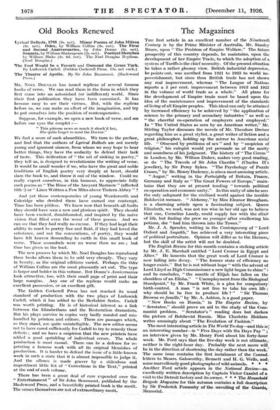The Magazines
THE first article in an excellent number of the Nineteenth Century is by the Prime Minister of Australia, Mr. Stanley Bruce, upon " The Problem of Empire Welfare." The future prosperity of this country depends, he maintains, upon the development of her Empire Trade, to which the adoption of a system of Tariffs is the chief necessity. Of the present situation he takes a rather gloomy view. British industrial depression, he points out, was ascribed from 1921 to 1923 to world im- poverishment, but since then British trade has not shown any real improvement, whereas " The League of Nations reports a 5 per cent. improvement between 1913 and 1925 in the volume of world trade as a whole." All plans for the development of Empire trade must be based upon the idea of the maintenance and improvement of the standards of living of all Empire peoples. This ideal can only be attained by increased efficiency to be achieved by " the application of science to the primary and secondary industries " as well as " the cheerful co-operation of employers and employed.", In " The United States as seen by an American writer," Mr. Stirling Taylor discusses the novels of Mr. Theodore Dreiser regarding him as a great stylist, a great writer of fiction and a great philosopher, holding up the mirror to American social life. " Obsessed by problems of sex " and by " suspicion of religion," his eulogist would yet persuade us of the sanity and soundness of his judgment. The history of " The Circus " in London, by Mr. Willson Dither, makes very good reading, so do " The Travels of Sir John Chardin " (Charles II's jeweller), by .Sir Percy Sykes. "The Psychology of Puzzle Crazes," by Mr. Henry Dudeney, is also a most amusing article.
" Augur," writing in the Fortnightly of Britain, France, Germany and Italy as " The Great Powers of Europe," main- tains that they are at present tending " towards political co-operation and economic unity." In this unity of aim he sees the only safeguard for the civilized world against the terrible Bolshevist menace. " Alchemy," by Atisq Eleanor Brougham,' is a charming article upon a fascinating subject. Queen' Elizabeth, we read, was not too wise in her old age to believe that one, Cornelius Landy, could supply her with the elixir of life, but finding she grew no younger after swallowing his, potions, she " had him thrown into the Tower."
Mr. J. A. Spender, writing in the Contemporary of " Lord Orford and Asquith," has achieved a very interesting piece of political portraiture. Opinion will differ as to the likeness,1 but the skill of the artist will not be doubted.
The English Review for this month contains a striking article' by Mr. J. E. Marshall entitled " Lord Cromer in Egypt and After." He laments that the great work of Lord Cromer is now falling into decay. " The former state of efficiency no longer exists." But he is not without hope " with the advent of Lord Lloyd as High Commissioner a new light began to shine" ; and he concludes, " the mantle of Elijah has fallen on the shoulders of an Elisha." " Unemployment from the Biological Standpoint," by Mr. Frank White, is a plea for compulsory, birth-control. A man " is not free to take his own life ; why should he be free to produce life ? " " Sir Thomas Browne en famille," by Mr. A. Ashton, is a good paper.
" New Books on Russia," in The Empire Review, by " Scrutator," should prove an aid to the study of the Com- munist problem. " Scrutator's " reading does but darken the picture of Bolshevist Russia. Miss Charlotte Haldane. writes amusingly about " The Evolution of Fashion."
The most interesting article in The World To-day--and this is; an interesting number—is " Five Days with Six Days Pay " ; an interview given by Mr. Henry Ford about his forty-hour week. Mr. Ford says that the five-day week is not ultimate, neither is the eight-hour day. Probably the next move will be in the direction of shortening the day rather than the week.' The same issue contains the first instalment of the Conrad. letters to Messrs. Galsworthy, Bennett and H. G. Wells, and; some marvellously good photographs of wild animals. * * * Another Ford article appears in the National Review—an excellently written description by Captain Victor Cazalet of a visit to the Detroit factory and its owner. * * * The Household Brigade Magazine for this autumn contains a full description by Sir Frederick Ponsonby of the unveiling of the Guards, Memorial.














































 Previous page
Previous page